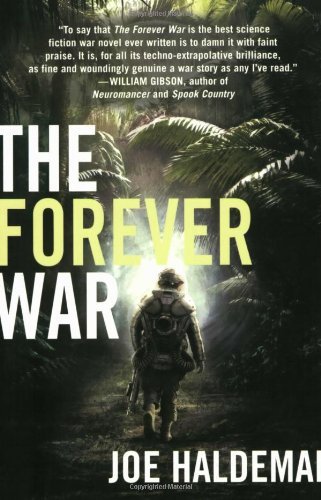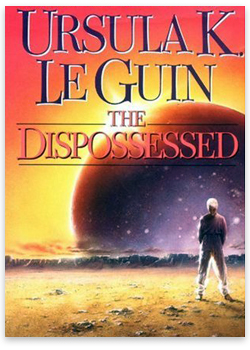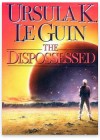What follows is a spoiler laden discussion of the book Man Plus by Frederik Pohl. Beware if you’re worried about such things.

Facing mutual self-destruction, the major governmental powers on Earth race into space. One solution: to create a cyborg capable of living and working on Mars without a suit. When the first test subject dies, Roger Torraway becomes the man of the hour. Or the man plus of the hour. As his body is gradually converted into a “Martian”, his mind has to cope with no longer being human while he angsts about his love for his cheating wife.
J: So.. Man Plus wasn’t a promising title. I didn’t know what to expect going into it. Except that you started it first and said it was horrible. And you were right. And not only did it not get better, it GOT WORSE. But, at least it was short.
K: Man Plus is a very ambiguous title, though it becomes clear enough as soon as you begin reading: Man+, new and improved man, etc. It’s certainly not double-plus good. I can’t, however, agree with you that it got worse: the first part of the book was definitely the lowest point for me. It didn’t improve, really, but the parts where Pohl abandoned his efforts at characterization and concentrated just on his science fiction were considerably better.
J: The first chapter was a straight infodump. So it’s true that it improved on hitting the second chapter, with actual action and dialog. And yes, it did get more interesting. But the treatment of the female characters got increasingly worse. With a little rise and sharp dip at the end. So it was just painful all the way through.
K: Maybe I just got numb to it. I don’t know. So, let’s first take a look at the basic premise: Earth is an environmental and political disaster area, and rather than figure out a way to fix this, instead, based on opinion polling, the Americans have decided to adapt a human so that he can live on Mars without a space suit. Which is sadly, totally believable.
J: Except I didn’t quite understand the point of it. Because it turns out they were going to send astronauts in suits along as well. And they haven’t built in any way for this man+ to reproduce once he’s on Mars. So if Earth continues to go to crap, there aren’t going to be any more Man Martians.
K: Exactly. It made no sense at all. But no doubt it made everyone feel good, even if it solved nothing at all and left them with pretty much the exact same problems as they had before, just less time to solve them in.
K: Considering they obviously had a way to create livable areas on the surface (the traditional ‘domes’), and the Man+ required considerable computer support and was able to be felled just by not buttoning closed a flap, it didn’t seem to me like this was a viable or reasonable long term OR short term solution.
J: Add to that that at least one other astronaut was there almost solely as tech support for him and you’ve wasted two slots you could’ve used for engineers or Mars experts. Or was it three? What was the priest there for?
K: He was an ‘aerologist’ or something like that. I wasn’t entirely sure what that was. It sounded like he was hoping to be an exobiologist if any exobioorganisms could be found. And then they needed an actual pilot who seemingly needed no additional skills, since he wasn’t going to be able to land regardless. But the strangest part was that the addition of ‘Brad’ to the team was apparently as last minute decision made practically on a whim! Considering how very many issues they had with Man+ just lauching into space what would they have done if they hadn’t sent him along?
J: He wasn’t the only whim they had either. But let me back up to explain the plot a bit more. However well I might manage it. Our main character is Roger Torraway and he’s an astronaut, though it’s been years since he was in space. He now works on a project to produce this Mars-adapted man. A friend and former colleague is the guinea pig. But things go horribly wrong and he dies. As guinea pigs are wont to do. And Torraway’s the new man for the job. And so we get to go through all these procedures and surgeries and tests with him, while he angsts about his wife having an affair. And, spoilers, they eventually do get to Mars.
K: It does seem to me to be the worst sort of stupidity to have put all your eggs in one basket. Why on Earth would they only have one prototype Marsman? Even though they act like it’s not a big deal that they must essentially start from scratch building Roger, it surely has to have delayed everything at least a bit!
J: And neither of them seems very keen on doing it either. Which has to make me wonder why they agreed! Surely ‘duty’ only goes so far. When they signed up to be astronauts, they didn’t sign up to be surgical modification guinea pigs. It’s not something I would want to do, or most people would want to do, but surely someone out there would be willing and eager. Since even the prior astronaut training seemed to be not essential. And yea, why wouldn’t you test these individual things on other people before slapping them into your one prototype? And to have your head eye guy NOT THERE when you’re installing the key piece of eye thing seems reckless. I have to say the humans in this story don’t come off looking good at all. Any of them.
K: The decisionmaking process of all of these people seemed extremely random and without any thought to potential consequences. Or at least, if they were aware of consequences, they didn’t take any steps to minimize risk. BUT it’s not just the humans who come off as idiots in the end, in my opinion.
J: I cannot disagree with that. And this is a major spoiler, I suppose. But we do warn about spoilers! Was the ‘twist’ ending any sort of surprise to you? I have to say I noticed the ‘we’ pretty early on and that was one of my guesses as to who ‘we’ was. Very high on the list.
K: It wasn’t a surprise exactly. I didn’t get the impression that the ‘we’ was intended to be subtle or easily missed, and it was very clear that the ‘we’ weren’t humans. I can’t say I guessed what the ‘we’ would be but then I didn’t spend a lot of time thinking about it either.
J: To me it read like a shift from third person omniscient to first person plural that was supposed to start out subtle. I don’t think you were supposed to notice right away. But it was easy to doubt it was an AI because the computers were so big and clunky and seemingly stupid. You know, early 1970s computers. I think punch cards are even referenced. At times, aliens seemed more likely.
K: I don’t remember the reference to punch cards. But it was interesting to me to see what Pohl felt would be the limitations of the computer intelligence. I’m not sure it was well thought out. For instance: the computers have been manipulating the US Government into doing this Mars mission and, more importantly, putting a big computer into orbit around Mars with a nice generator. But they simultaneously concluded that it would be impossible for them to get someone to build an end-of-the-world bunker on some isolated island somewhere. To me, these seem like they require similar levels of manipulation. Surely the computers could easily pretend to be a corporation and trick some humans into doing the work for them. It doesn’t seem especially far-fetched given the set of parameters we have.
J: Or send robots to Mars rather than a cyborg. Just seems so much easier. Or a number of other scenarios. I mean, they don’t even need to be on Mars. Just a bunch of computerized spaceships would be good for a start. What bothered me was the machine intelligence was sexist too! Why are they all ‘brothers’? They don’t have a sex, why should they need a gender? What was so wrong with the word ‘sibling’ or ‘cousin’ or something? Siiigh.
K: Yeah, that was odd. I guess on that note we may as well talk about the issues with the female characters in this book. Of which there were many — issues, not female characters. Starting with Roger’s wife, Dorrie. Who apparently has her own thoughts and needs (good), and works because she wants to (good), but is running a store with no actual effort made to be profitable (bad), because her husband wants to support her ‘hobby’ (bad). And she’s kind of a bitch (neutral).
J: The first time we see a female character, she’s being patronized by the President of the United States. How the pretty little things had to put up with having their nails soaked to remove poisons, lest they scratch him. Actually reading those security measures was interesting, because they weren’t much more, to see the President, than they would be today to, go to Ohio.
K: And his interaction is given as evidence of how personable he is. It struck me more as something straight out of Mad Men, and certainly not something for the mid-70s, when feminism as a movement was really quite far underway. Except Pohl then later proceeds to treat us to a weird scene where Dorrie, now famous as Roger’s spouse, is interviewed by a feminist magazine. I couldn’t tell if he was trying to make the feminists look ridiculous by portraying them as fringe, or being inclusive and just kind of clueless about how to do it.
J: Yea, the feminist character was even worse than his portrayal of the other women. She resents having to do the interview at all, because the magazine isn’t interested in Dorrie for Dorrie’s sake, but just because she’s this famous astronaut’s wife. So right from the start she has this bad rapport with the person she’s supposed to be interviewing. Not that she cares. And says some pretty horrible things to her that aren’t feminist at all. ‘What sort of example are you going to set young womanhood? Turning yourself into a dried-up old maid?’ Calling marriage a ‘ridiculous farce’. Though I liked that her interview crew seemed to be all women. Though I don’t know whether the ‘prop boys’ were or not. It was interesting he said ‘lightperson’, ‘soundperson’, ‘cameraperson’, because those terms were so fine I didn’t even notice they were gender neutral. Until he surprised me by making them women. Up to now the only women had been wives and nurses. So I was definitely assuming anyone else was a man.
K: It was wiser to make that assumption, though we did find that one of the ‘nurses’ was actually a psychologist in disguise, and there did seem to be a woman involved in the testing phase of Roger’s abilities who didn’t seem to be a nurse? I don’t quite remember what her actual position was, though.
J: It wasn’t clear if he was trying to realistically portray a feminist and doing it badly, or making fun of them. But yea, not only is she a psychologist, but a major and an astronaut. At least by training even if she hadn’t gotten into space before. But even she doesn’t get off lightly. Because for some reason it’s thought if she pretends to be a nurse and looks like his wife, that this’ll help him adapt to his wife not being there for him. Or something? So she’s a surrogate love interest first, and psychologist only second.
K: Yeah, I wasn’t entirely sure what was going on there. Certainly Roger’s stalkery obsession with his wife should have caused him to fail some kind of psychological tests required to become an astronaut, let alone their prize cyborg?
J: You’d think. What was even more strange was that they apparently had an open marriage anyway. So it wasn’t that she was having sex with this other guy, or even that it was another guy he knew, but that it was happening while they were living together, rather than in different parts of the world? Or something? She wasn’t doing it in the right way, basically. Oh and they built in his fail-safe warning procedure to hallucinate her. Whose brilliant idea was that?
K: The priest even admits later he realizes now that was a huge mistake. But apparently the 12-year-old boy ethos continues to reign supreme even at future NASA. I bet they digitally enhanced her boobs too.
J: *laugh* Yea, I don’t know why they didn’t change it when they realized it would be a problem. Women are definitely sex objects in this book. As in, objects to have sex with. The psychologist astronaut? She goes up in space in a different ship, with one guy. And they have sex. Even though the all-male crew of the other ship seemed to be fine with spending months not getting any. The wife of the first guinea pig, she comes down to have a look at what he looks like now. Then she expresses concern that he’s not getting any, and offers. Only to be told he doesn’t have the equipment. So.. she leaves. Without talking to him or seeing him, or kissing him or touching him or anything. Like, well, if I can’t have sex, then my role as wife is moot. Even the nun the priest is dating could have sex if they filled out the right paperwork!
K: The part with the first man’s wife was very odd. The whole book was definitely written from a male perspective, and was weirdly progressive in certain places and weirdly regressive in others. In that sense, it made me think of Forever War and its odd treatment of the female soldiers.
J: A male perspective is extra odd considering the narrator is this machine intelligence. Oh, and seemingly out of nowhere, near the end of the book, the psychologist/astronaut is called a ‘girl’. Just, for no reason, and it wasn’t something I’d seen used earlier. Though it might’ve been and I just didn’t notice then.
K: I don’t know. The reference didn’t spring out at me, so it must not have been that egregious. The male characters (aside from Roger, who as I mentioned before I felt was rather unstable) seemed all right. No super deep characterizations, but they were all types that have shown up in other books and didn’t really strain credulity there.
J: Yea, they were okay. I didn’t like any of them particularly, but they didn’t make me want to throw the book across the room.
K: And the cyborg idea was pretty interesting. I just wish it felt more logical in the end to have even done it. The whole musing on how it would be necessary to cut down on the inputs because his brain just couldn’t handle the information overload struck me as a fresh idea.
J: Although the example that young adults who’d been blind all their lives and were given sight then killed themselves because their brains couldn’t adapt? Was that a real thing that happened?
K: Extensive research in wikipedia suggests… sort of. Though I didn’t get the impression that in the book he was talking about real cases, but about the use of artificial eyes a la Geordi La Forge.
J: I got the impression he was referring to a real thing, or what seemed to be a real thing. But maybe, yea. Anyway, the whole cyborg thing. Well, it’s odd to even think of him as a cyborg, because it.. well, maybe it’s just what I’ve seen in sf/f lately. Steampunk often delves into biomedical stuff. All Men of Genius with surgeries and Westerfeld’s Leviathan series with genetic manipulation. So it was just I guess hard for me to think of it as a cyborg, even though yea, it was all machine and electronic bits and not organic bits. So even though it was a cyborg and I can’t argue with that, it still felt to me like ‘old-school’ steampunk or Cold War surgeries. Like, hey, let’s give him two heads. Even though that wasn’t it. And apparently cyborgs are awesome guitar players. That was random.
K: That was very random. I wasn’t sure if it was trying to restore his manliness after he was castrated or what. But anyway, not being a connoisseur of steampunk or clockwork or anything, what it reminded me of the most was the Borg (the original Borg, not how they ended up). Except the Borg started their adaptations as babies — perhaps to overcome the sensory overload issues. And of course this predates almost all of that.
J: Does it predate cybermen?
K: Inasmuch as the Cybermen appeared in 1966, no.
J: But they didn’t have wings.
J: One other thing I wanted to be sure to mention is his term ‘sinonaut’. Presumably this is referring to the Asian astronauts. Asia seems to be this large.. faction, coalition? It seemed an odd term, so I Googled it. It literally means something like ‘traveler to China’. So it makes absolutely no sense to use it, and is possibly not very PC either. Since astro- and cosmo- refer to you know, space. And cosmonaut is just an Englished-up version of the Russian word. Wikipedia is helpful again here. The proper term to use for Chinese astronauts, if you’re not going to just call them astronauts, and aren’t very good with Chinese, is taikonauts. Which is taking part of a term used in Chinese and referring to, you know, space, and not traveling to China, and then slapping the -naut on there. http://en.wikipedia.org/wiki/Astronaut Although it seems some people do use ‘sinonaut’. I wonder if Pohl invented it, or if other science fiction writers did. I’m not sure when the Chinese space program really started.Or if people sort of re-invent it. And it’s just wrong every time.
K: Interesting. But yes, it does seem a bit odd — like Frenchonaut or something. The only other thing which I felt I must mention is how much it weirded me out to have a Dorrie in this book. I wasn’t expecting it, and it just took me by surprise.
J: It was odd to me too. Though I’m sure odder for you. I was hoping she wouldn’t do anything too cringe-worthy! Like, I didn’t want to hate the character. Fortunately she came off fairly well.
K: I suspect only because she had so little screentime, but yeah, she didn’t do anything very objectionable at all.
J: So that’s Man Plus. I hope he didn’t do a sequel Man++ that we have to read later. Although we do have to read another Pohl next, because he won two years in a row. Lesigh.
K: There is a sequel, but it was apparently written with someone else, 20 years later, and it has very bad reviews on amazon. I think I’ll pass.



 This is part two of our discussion on the Nebula Award winner Forever War, by Joe Haldeman. In the
This is part two of our discussion on the Nebula Award winner Forever War, by Joe Haldeman. In the 
 Physicist Shevek leaves his homeworld to join physicist colleagues on the planet his people abandoned generations ago. The Urrastian’s aggressively capitalistic and gender-segregated society is quite a change from the anarchism/non-authoritarian communism practiced on Annares, his home. At home, no one owns anything, people live in dorms, and share in either prosperity or lack. Though some are starting to wonder if they really are as free as they believe. Shevek is determined to share his breakthroughs with the known universe, and he’s not sure either Annares or Urras will permit him to do it.
Physicist Shevek leaves his homeworld to join physicist colleagues on the planet his people abandoned generations ago. The Urrastian’s aggressively capitalistic and gender-segregated society is quite a change from the anarchism/non-authoritarian communism practiced on Annares, his home. At home, no one owns anything, people live in dorms, and share in either prosperity or lack. Though some are starting to wonder if they really are as free as they believe. Shevek is determined to share his breakthroughs with the known universe, and he’s not sure either Annares or Urras will permit him to do it.
 In the 22nd century, humans have spread out all over the Solar System, colonizing everywhere from Mercury to the moons of the gas giants. But in spite of their expansion, the fabled ‘space drive’ has still eluded scientists and many believe it’s not even possible to construct. All is thrown into question by the appearance of a strange object which enters the Solar System on a course to swing around the sun. The object is clearly artificial — the work of another race. The spaceship Endeavour is the only ship within range of its projected path and thus its crew is given the task of making contact with the object, now named “Rama”, and attempting to collect as much information as possible before its path goes too close to the sun for humans to follow. Though the collective governments of the various human settlements are excited by this unprecedented arrival, they are also quite nervous: is Rama a threat? The Endeavour crew will need to try and discover that as well.
In the 22nd century, humans have spread out all over the Solar System, colonizing everywhere from Mercury to the moons of the gas giants. But in spite of their expansion, the fabled ‘space drive’ has still eluded scientists and many believe it’s not even possible to construct. All is thrown into question by the appearance of a strange object which enters the Solar System on a course to swing around the sun. The object is clearly artificial — the work of another race. The spaceship Endeavour is the only ship within range of its projected path and thus its crew is given the task of making contact with the object, now named “Rama”, and attempting to collect as much information as possible before its path goes too close to the sun for humans to follow. Though the collective governments of the various human settlements are excited by this unprecedented arrival, they are also quite nervous: is Rama a threat? The Endeavour crew will need to try and discover that as well.